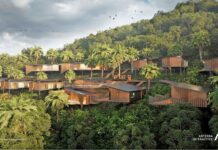Waiheke High School is being gently nudged to increase Te Reo and Maori cultural learning opportunities.
Nearly 60 parents of school-age children responded to an online ‘Survey Monkey’ created by parent Elisha Scott to test demand for Te Reo Maori, immersion classes and a bilingual unit.
She says early childhood centres and both primary schools on the island have increased Maori language and cultural learning options but opportunities drop-off once children reach the high school.
Ms Scott shared her findings with the board of trustees at its last meeting and the board has promised to consider the findings in conjunction with an upcoming Education Review Office report on what the school is delivering.
Board chairman Andrew Walters says the board is open to catering for the school community’s wishes but needs to balance that with national curriculum outcomes.
Ms Scott stresses she is not out to undermine the high school’s programme. “I don’t want to cause any friction but I think the island can do better and we can work together.
“I just decided to find out if I was all alone [in my thinking],” she says.
The survey shows there is demand on the island (as reflected in our story last week about Waiheke Adult Learning’s Te Reo course).
Nearly three-quarters of survey respondents were non-Maori, although the proportion of parents with Maori children was higher. Most respondents had children of primary school age, with 21 percent having children in the intermediate years and 21 percent having children of high school age.
Thirty-one parents (54 percent) wanted Maori to be taught as a weekly subject. Twenty-eight (49 percent) wanted Maori taught in form class where students come together at the start of each day. This might include karakia, waiata and some Te Reo learning.
Twenty-three parents (40 percent) wanted Maori incorporated daily in all classes at the high school’s discretion.
Over a third of respondents (37 percent) wanted a bilingual unit in which subjects are delivered in Maori and English.
Sixteen parents (28 percent) supported a total immersion unit in which all subjects are delivered in Maori only.
Only eight respondents (14 percent) were happy with the high school’s current Te Reo offering for senior students.
Five parents intended to enrol their tamariki (children) elsewhere partly due to a desire for more Te Reo Maori.
• Geoff Cumming







